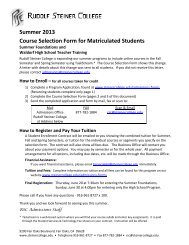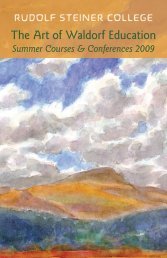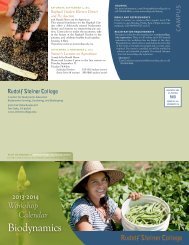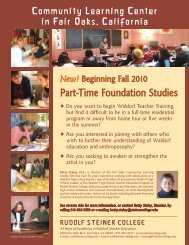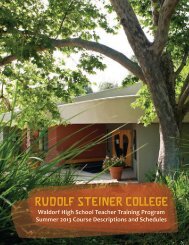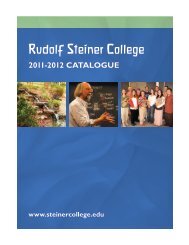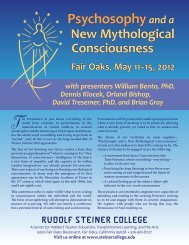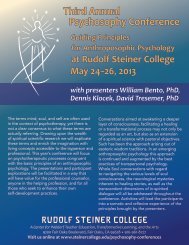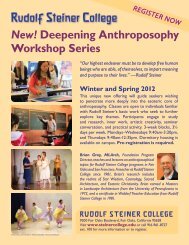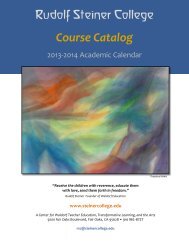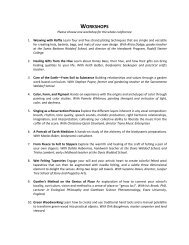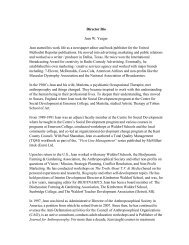The Art of Waldorf Education - Rudolf Steiner College
The Art of Waldorf Education - Rudolf Steiner College
The Art of Waldorf Education - Rudolf Steiner College
- No tags were found...
Create successful ePaper yourself
Turn your PDF publications into a flip-book with our unique Google optimized e-Paper software.
22 WALDORF HIGH SCHOOL TEACHER EDUCATIONWALDORF HIGH SCHOOL TEACHER EDUCATION23TWELFTH-GRADE CURRICULUMMORNING COURSESJuly 2–6 and July 9–13, 9:35-11amEnglishwith Mary EmeryWeek One: Faust, Part One and Two. An introduction to Goethe’s Faust as an essentialculmination <strong>of</strong> the <strong>Waldorf</strong> curriculum and a relevant experience for high school seniors.Recommended reading: Faust, Part One and Two, Goethe, Walter Arndt translation; Philosophy<strong>of</strong> Freedom, <strong>Rudolf</strong> <strong>Steiner</strong>; Saving the Appearances, Owen Barfield.Week Two: Focus on the writings <strong>of</strong> the Transcendentalists.Recommended reading: Essays by Ralph Waldo Emerson; Civil Disobedience and Walden,Henry David Thoreau; poetry by Emily Dickinson, <strong>The</strong> Scarlet Letter, Nathaniel Hawthorne;Moby Dick, Herman Melville; poetry by Walt Whitman.Course fee (per week): $345 through June 15; $370 after June 15Historywith Nicole Fields and Diamela WetzlWeek One with Diamela Wetzl: Latin American History. An account <strong>of</strong> the cultural, political,social, and economic life <strong>of</strong> the region from the fifteenth century Spanish conquest and colonialperiod to the present, including struggle for democracy, US policies and hegemony over theregion, the neo-liberal economic model and the current economic situation.Week Two with Nicole Fields: African History. Africa is a place <strong>of</strong> beauty, ancient culture, and,in the modern era, terrible strife. We will briefly explore the wide variety <strong>of</strong> geography, people,history, politics, and issues <strong>of</strong> this most wonderful continent. Be prepared for discussion andpresentations <strong>of</strong> research.Required reading: King Leopold’s Ghost, Adam Hochschild; Things Fall Apart, Chinua Achebe.Recommended reading: Africa: A Biography <strong>of</strong> the Continent, John Reader; Favorite AfricanFolktales, edited by Nelson Mandela.Course fee (per week): $345 through June 15; $370 after June 15Physicswith John PeteringAn exploration <strong>of</strong> sense-based phenomenology, topics, and pedagogy which underlies the twelfthgradephysics block. We will explore the pedagogy <strong>of</strong> teaching twelfth graders, the <strong>Waldorf</strong>curriculum indications, and possible approaches to the design and syllabus for this block. Keytopics include: physical optics including photometry, shadows, mirrors and reflection, refraction,Snell’s Law and critical angle, double refraction, polarization phenomena and Brewster’s angle,human experience <strong>of</strong> vision and color, and coherency in laser light. Emphasis will be placed onthe experience <strong>of</strong> vision as the organizing idea for understanding optical phenomena.Course fee (for two weeks): $690 through June 15; $715 after June 15Life Sciencewith Merrily LovellIn zoology we survey the whole animal kingdom. With the classifications, descriptions, andcharacterizations from modern science, it is possible to find a wholeness in this huge body<strong>of</strong> information through seeing, in subtle and more obvious ways, how each animal group isconnected to the human being. Darwin’s theory <strong>of</strong> evolution, the foundational theory in modernbiology, can be presented as a developing controversy with conflicting information—a valuableopportunity for students to explore conflicting scientific information, master the observationsand resultant concepts, and be challenged to come up with conclusions based on their own clear,logical and creative thinking. Morning sessions will include lectures and discussions.Required reading: Harmony <strong>of</strong> the Creative Word, <strong>Rudolf</strong> <strong>Steiner</strong>; Childhood and HumanEvolution, Friedrich Kipp.Course fee (for two weeks): $690 through June 15; $715 after June 15. Continued in the afternoon.Mathematicswith Ernst Schuberth, PhDWe will explore the meaning <strong>of</strong> mathematical mappings and functions in math (with anoutlook to projective mappings), steps towards a pure (sense free) thinking, pre-calculus andintroduction to calculus, integration, and differentiation.Course fee (for two weeks): $690 through June 15; $715 after June 15Spanishwith Diamela WetzlWeek One: Students will join the history class in Latin American History.Week Two: Continues Week One afternoon class which introduces <strong>Rudolf</strong> <strong>Steiner</strong>’s pedagogicaland curriculum recommendations and which enables students to successfully achieve reading,writing, listening/comprehension, and speaking skills.Course fee (for two weeks): $690 through June 15; $715 after June 15. Continued in the afternoon.Fine <strong>Art</strong>swith Ted Mahle and Iris SullivanWeek One with Ted Mahle: Veil Painting. Two veil paintings will be worked on in polar styles.<strong>The</strong> first will be painted in a more universal or “Impressionist” technique, where the quiet colorbalance is sought as the deepening proceeds. <strong>The</strong> second will be painted in a more personal or“Expressionist” technique, in the free “letting go” <strong>of</strong> the balance, then repeatedly finding neworder on deeper levels.Week Two with Iris Sullivan: Survey <strong>of</strong> Fine <strong>Art</strong>s. This course will survey all <strong>of</strong> the highschool fine arts through light and dark drawing, ink slanted drawing, color pastel still life andlandscapes, and painting color moods with water colors.Course fee (per week): $345 through June 15; $370 after June 15. Continued in the afternoon.



